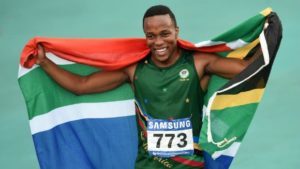Biography of Buti Manamela: Age, Wife, Career, Net Worth & Contact Details
Buti Manamela Biography, Profile, Age, Wife, Career, Net Worth & Contact Details
Buti Manamela (born 10 July 1979) whose full name is Buti Kgwaridi Manamela, is a South African politician. He is currently serving as the Deputy Minister of Higher Education and Training.
Buti Manamela also previously served as the Deputy Minister for Planning and Monitoring in the Presidency since 26 May 2014.

| Full Name | Buti Kgwaridi Manameli |
|---|---|
| Date of Birth | 10 July 1979 (age 42 years old) |
| Spouse | Vuyo Mhlakaza |
| Gender | Male |
| Occupation | Politician |
| Nationality | South African |
| Net Worth | $2 million |
Buti Manamela Age
He was born on the 10th of July 1979 in Modimolle, South Africa. As of 2026, he is 42 years old and celebrates his birthday on July 10th every year.
Buti Manamela Wife
He is married to Vuyo Mhlakaza and together they have two children.
Buti Manamela Net Worth
He currently has an estimated net worth of around $2 million which he has earned as a politician.
Buti Manamela Twitter
Buti Manamela Contact Details
- Tel: 083 759 4157/ 012 308 1800/ 041 464 2100
- Fax: 012 300 5795
Buti Manamela News
Source; africanews.com
Programme Director; Vice Chancellor of UNISA – Prof Mandla Makhanya; Keynote Speaker – Prof Kwesi Prah; Distinguished academics
The subject of decolonization of higher education has been at the centre of numerous discourses, student and academic protests and intense dialogue and debate in post-apartheid South Africa.
South Africa, like the Global South, possesses higher education institutions with direct and deep roots in colonialism and racism that are challenging existing structures and invoking indigenization, diversification, depatriarchalization, decolonization and democratization.
Comparative insights and experiences of change in the higher education sector across the Global South are important at this time.
Therefore this conference is important for the higher education sector as a whole
Decolonisation is commonly understood as the undoing of colonialism.
It entails the process whereby colonised people rediscover and recover their own history, culture, language and identity.
It is when colonised people invoke their histories, worldviews, and indigenous knowledge systems to theorise and imagine alternative possibilities, including a different curriculum.
Decolonisation is a necessary response to first and second generation colonialism, neo-colonialism and neoliberalism.
First generation colonialism was the conquering of the physical spaces and bodies of the colonised, whilst second generation colonialism was involved with the colonisation of the mind through disciplines, such as education, science, economics and law.
Neo-colonialism relates to the achievement of technical independence by a country, but that is still under the influence of the ex-colonial country.
The first President of independent Ghana, Kwame Nkrumah, argued that neo-colonialism is a more insidious form of colonialism because it is more difficult to detect.
It also involves new-elites who were trained by colonialists and that take on the roles of colonialists in countries, post-independence.
In the context of South African higher education, decolonisation is the comprehensive transformation or change of the curriculum and institutional cultures to primarily reflect and promote African context.
It signifies the process of effecting meaningful change in the academic, social, economic, demographic, political and cultural domains of institutional life. It relates to discarding what has been wrongly written and interrogating distortions of people’s life experiences, negative labelling, deficit theorizing, genetically deficient or culturally deficient models that pathologized the colonised.
It involves retelling the stories of the past and envisioning the future.
It is about self-determination and social justice for those who have been marginalised by the Western academy and about seeking legitimacy for knowledge that is embedded in their own histories, experiences and ways of viewing reality.
It is about the formulation, legislation and dissemination of ethical issues related to the protection of indigenous knowledge systems.
Decolonisation accentuates the importance of teaching/learning in indigenous languages as part of the anti-imperialist struggle.
It relates to international scholars sharing common experiences, issues and struggles of colonised people in global and local spaces.
It is also concerned with a critical appraisal of the imperial model of the academy that continues to deny the colonised and historically marginalised other spaces to communicate from their own frames of reference.
Since inception, all South African universities adopted Western models of academic organisation which largely excluded and decimated the knowledge of black people.
The colonial model of the academic organisation of the university, based on Western disciplinary knowledge, was entrenched during apartheid and has not been sufficiently transformed in the post-apartheid era.
Although student demographics at South African universities, particularly in historically predominantly white universities, changed significantly, staff demographics have not changed in accordance.
This has ensured the preservation of colonial academic organisation, including curricula.
These colonial academic organisations also include historical legacies of capitalism, racism and patriarchy as intrinsic to institutional cultures and practices in Universities.
Recent events surrounding the #RhodesMustFall campaign have reinvigorated the need to transform these prevailing colonial academic organisations and to create African universities located in a national and regional context that centres the African and African knowledge and practices as vital to human relationships and growth.
The #RhodesMustFall campaign was not just about a statue but about the need to decolonise the institutional culture and practices of the university more broadly.
There is an urgent need to create new kind of academic institutions with new kind of public spaces premised on Constitutional principles of human dignity and equality.
Decolonizing the university starts with the de-privatization and rehabilitation of the public spaces.
It starts with a redefinition of what is public, i.e., what pertains to the realm of the common and as such, does not belong to anyone in particular because it must be equally shared between equals.
The decolonization of buildings and public spaces includes a change of those colonial names, iconography, i.e., the economy of symbols whose function, all along, has been to induce and normalize particular states of humiliation based on white supremacist presuppositions.
Such names, images and symbols have nothing to do on the walls of a public university campus more than 20 years into a democratic dispensation.
The biggest question when it comes to these issues is whether, in their current form, they are relevant for the massive expansion of higher education in South Africa, which has opened up to students across race and class lines.
Some, if not many of these students don’t fit the profile of the typical rich and middle class, white, “university-ready” 18-year-old school leavers, but are students from rural and historically disadvantaged backgrounds, young adults some with families and responsibilities already, not so good basic education results, etc.
The involvement of students and the prospective employers is an issue of concern that universities need to consider when developing the curriculum, teaching and research methods.
For example, it is common knowledge that curriculum content is predominantly western, capitalist, heterosexual and dominated by European worldviews in South Africa.
It is necessary therefore that the content is changed to include the perspectives, experiences and epistemologies of Africa.
A clear strategy to tackle the issue of decolonisation of the curriculum, teaching and research needs to be developed.
It is clear that this will need different kinds of resources and expertise.
The unequal distribution of resources in higher education further compounds this predicament.
Serious consideration of a strong focus on rectifying this is necessary.
The risk of not having a clear strategy is that higher education will look no different 10 years down the line than what it is currently.
The Western model of the academic organisation on which the South African university is based, remains largely unchallenged.
One way of challenging it is to ask bold and controversial questions and have continuous engagements to try and come up with answers.
Decolonisation involves fundamental rethinking and reframing of the curriculum and bringing South Africa and Africa to the centre of teaching, learning and research.
It’s time for Africa to tell its own stories in university classrooms.
Everyone, academics, students, workers, government officials, parents, business, the community and many more must come on board to ensure the success of reviewing and rethinking the curriculum to get to curriculum that incorporates epistemic perspectives, knowledge and thinking from the African continent and the global South into their teaching, research and community engagement.
So this is not to isolate South African universities from the rest of the world.
South African universities enjoy autonomy in a wide range of areas including the nature of the curriculum, teaching and research.
However, they have to be responsive to the constituencies they serve if they are to be relevant.
Efforts to decolonise the curriculum, teaching and focus of research must, therefore, be undertaken at the institutional level and with the involvement of the range of university constituencies including students for whom curriculum, teaching and research are primarily intended.
There is already a range of meaningful curriculum reform, teaching support and research development initiatives underway in most universities.
From the perspective of the Department of Higher Education and Training (the Department), these initiatives are supported by the University Capacity Development Programme (UCDP), the Department’s flagship programme to transform teaching, learning, researching and leading towards enhanced quality, success and equity in universities.
The programme formally started in January 2018, although first steps were taken much earlier.
Teaching and research development at universities are key components of the UCDP and a range of programmes have been conceptualised and are being implemented to build capacity in these areas.
The UCDP is intended to enable an integrated approach to capacity development across three focus areas, namely: i) student development; ii) staff development and iii) programme/curriculum development.
The budget allocation for the UCDP is almost R1 billion for the 2018 academic year.
The first comprehensive component of the University Capacity Development Programme – the New Generation of Academics Programme (nGAP) has gone from strength to strength and is now a well-regarded capacity development programme in the sector that is making a difference.
Thus far, a total of 373 nGAP posts have been allocated to universities.
Over 80% of the posts are held by Black and/or women academics.
From 2018 onwards, and as part of the UCDP, a minimum of 100 new nGAP posts will be made available.
The nGAP serves to recruit new academics which we hope will contribute to the issues of decolonisation.
The University Staff Doctoral Programme follows on from the nGAP and it is intended to support existing academics to achieve doctoral degrees.
The USDP was initiated as part of the Staffing South Africa’s Universities Framework (SSAUF) component of the UCDP.
The main purpose of the USDP is to support academics at South African universities to achieve doctoral degrees.
A secondary purpose is to build supervisory capacity at South African universities.
A third purpose is to promote collaboration between South African and international universities.
All these programmes will, in one way or the other, have an influence in the debate around decolonization.
Through the UCDP, universities are also implementing programmes on decolonization of the curriculum under the component of Programme/Curriculum development.
Universities started with the implementation of these programmes in early 2018.
Progress in their implementation will be monitored as we expect to learn some useful lessons that will contribute to the discourse of decolonization.
There are many debates around decolonization of higher education, including some voices that vociferously maintain that the debate is irrelevant and that the focus should be on increasing throughput and graduation rates.
There is work being done at an institutional level and through the various initiatives of the DHET, as I earlier outlined.
But there is more than we can do.
This conference must contribute to the change agenda of decolonizing higher education.
It must reflect on what is being done and assess where the gaps are.
It must propose new initiatives at an institutional and national level.
And finally, it must give further impetus to continuing the fight for decolonized knowledge, teaching and learning in higher education in South Africa and beyond.
I thank you.
Drop your queries regarding Buti Manamela Biography below in the comment box.
SHARE THIS POST WITH OTHERS:





